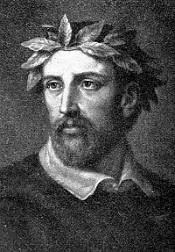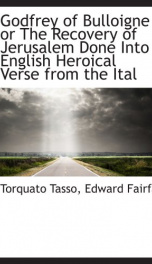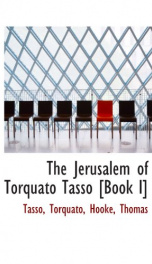Tasso Torquato

Torquato Tasso (11 March 1544 – 25 April 1595) was an Italian poet of the 16th century, best known for his poem La Gerusalemme liberata (Jerusalem Freed, 1580), in which he depicts a highly imaginative version of the combats between Christians and Muslims at the end of the First Crusade, during the siege of Jerusalem. He died a few days before he was due to be crowned as the king of poets by the Pope. Until the beginning of the 19th century, Tasso remained one of the most widely read poets in Europe. Born in Sorrento, he was the son of Bernardo Tasso, a nobleman of Bergamo, and his wife Porzia de Rossi, a noblewoman from Tuscany. His father had for many years been secretary in the service of Ferrante Sanseverino, prince of Salerno, and his mother was closely connected with the most illustrious Neapolitan families. The prince of Salerno came into collision with the Spanish government of Naples, was outlawed, and was deprived of his hereditary fiefs. Tasso's father shared in this disaster of his patron. He was proclaimed a rebel to the state, together with his son Torquato, and his patrimony was sequestered. These things happened during the boy's childhood. In 1552 he was living with his mother and his only sister Cornelia at Naples, pursuing his education under the Jesuits, who had recently opened a school there. The precocity of intellect and the religious fervour of the boy attracted general admiration. At the age of eight he was already famous. Soon after this date he joined his father, who then resided in great poverty, an exile and without occupation, in Rome. News reached them in 1556 that Porzia Tasso had died suddenly and mysteriously at Naples. Her husband was firmly convinced that she had been poisoned by her brother with the object of getting control over her property. As it subsequently happened, Porzia's estate never descended to her son; and the daughter Cornelia married below her birth, at the instigation of her maternal relatives. Tasso's father was a poet by predilection and a professional courtier. Therefore, when an opening at the court of Urbino was offered in 1557, Bernardo Tasso gladly accepted it. The young Torquato, a handsome and brilliant lad, became the companion in sports and studies of Francesco Maria della Rovere, heir to the duke of Urbino. At Urbino a society of cultivated men pursued the aesthetical and literary studies which were then in vogue. Bernardo Tasso read cantos of his Amadigi to the duchess and her ladies, or discussed the merits of Homer and Virgil, Trissino and Ariosto, with the duke's librarians and secretaries. Torquato grew up in an atmosphere of refined luxury and somewhat pedantic criticism, both of which gave a permanent tone to his character. At Venice, where his father went to superintend the printing of the Amadigi (1560), these influences continued. He found himself the pet and prodigy of a distinguished literary circle. But Bernardo had suffered in his own career so seriously from dependence on the Muses and the nobility that he now determined on a lucrative profession for his son. Torquato was sent to study law at Padua. Instead of applying himself to law, the young man bestowed all his attention upon philosophy and poetry. Before the end of 1562, he had produced a narrative poem called Rinaldo, which was meant to combine the regularity of the Virgilian with the attractions of the romantic epic. In the attainment of this object, and in all the minor qualities of style and handling, Rinaldo showed such marked originality that its author was proclaimed the most promising poet of his time. The flattered father allowed it to be printed; and, after a short period of study at Bologna, he consented to his son's entering the service of Cardinal Luigi d'Este. In 1565, Tasso for the first time set foot in that castle at Ferrara which was destined for him to be the scene of so many glories, and such cruel sufferings. After the publication of Rinaldo he had expressed his views upon the epic in some Discourses on the Art of Poetry, which committed him to a distinct theory and gained for him the additional celebrity of a philosophical critic. The age was nothing if not critical; but it may be esteemed a misfortune for the future author of the Gerusalemme that he should have started with pronounced opinions upon art. Essentially a poet of impulse and instinct, he was hampered in production by his own rules. The five years between 1565 and 1570 seem to have been the happiest of Tasso's life, although his father's death in 1569 caused his affectionate nature profound pain. Young, handsome, accomplished in all the exercises of a well-bred gentleman, accustomed to the society of the great and learned, illustrious by his published works in verse and prose, he became the idol of the most brilliant court in Italy. The princesses Lucrezia and Leonora d'Este, both unmarried, both his seniors by about ten years, took him under their protection. He was admitted to their familiarity. He owed much to the constant kindness of both sisters. In 1570 he travelled to Paris with the cardinal. Frankness of speech and a certain habitual want of tact caused a disagreement with his worldly patron. He left France next year, and took service under Duke Alfonso II of Ferrara. The most important events in Tasso's biography during the following four years are the publication of Aminta in 1573 and the completion of Gerusalemme Liberata in 1574. Aminta is a pastoral drama of very simple plot, but of exquisite lyrical charm. It appeared at the moment when music, under Palestrina's impulse, was becoming the main art of Italy. The honeyed melodies and sensuous melancholy of Aminta exactly suited and interpreted the spirit of its age. Its influence, in opera and cantata, was felt through two successive centuries. The Gerusalemme Liberata occupies a larger space in the history of European literature, and is a more considerable work. Yet the commanding qualities of this epic poem, those which revealed Tasso's individuality, and which made it immediately pass into the rank of classics, beloved by the people no less than by persons of culture, are akin to the lyrical graces of Aminta. Its hero was Godfrey of Bouillon, the leader of the first Crusade; the climax of the epic was the capture of the holy city. It was finished in Tasso's thirty-first year; and when the manuscripts lay before him the best part of his life was over, his best work had been already accomplished. Troubles immediately began to gather round him. Instead of having the courage to obey his own instinct, and to publish the Gerusalemme as he had conceived it, he yielded to the critical scrupulosity which formed a secondary feature of his character. The poem was sent in manuscript to several literary men of eminence, Tasso expressing his willingness to hear their strictures and to adopt their suggestions unless he could convert them to his own views. The result was that each of these candid friends, while expressing in general high admiration for the epic, took some exception to its plot, its title, its moral tone, its episodes or its diction, in detail. One wished it to be more regularly classical; another wanted more romance. One hinted that the Inquisition would not tolerate its supernatural machinery; another demanded the excision of its most charming passages, the loves of Armida, Clorinda and Erminia. Tasso had to defend himself against all these ineptitudes and pedantries, and to accommodate his practice to the theories he had rashly expressed. As in the Rinaldo, so also in the Jerusalem Delivered, he aimed at ennobling the Italian epic style by preserving strict unity of plot and heightening poetic diction. He chose Virgil for his model, took the first crusade for subject, infused the fervour of religion into his conception of the hero Godfrey. But his natural bias was for romance. In spite of the poet's ingenuity and industry the stately main theme evinced less spontaneity of genius than the romantic episodes with which he adorned it, as he had done in Rinaldo. Godfrey, a mixture of pious Aeneas and Tridentine Catholicism, is not the real hero of the Gerusalemme. Fiery and passionate Rinaldo, Ruggiero, melancholy impulsive Tancredi, and the chivalrous Saracens with whom they clash in love and war, divide the reader's interest and divert it from Goffredo. The action of the epic turns on Armida, the beautiful witch, sent forth by the infernal senate to sow discord in the Christian camp. She is converted to the true faith by her adoration for a crusading knight, and quits the scene with a phrase of the Virgin Mary on her lips. Brave Clorinda dons armour like Marfisa, fighting in a duel with her devoted lover and receiving baptism from his hands at the time of her pathetic death; Erminia seeks refuge in the shepherds' hut. These lovely pagan women, so touching in their sorrows, so romantic in their adventures, so tender in their emotions, rivet the readers' attention, while the battles, religious ceremonies, conclaves and stratagems of the campaign are easily skipped. The truth is that Tasso's great invention as an artist was the poetry of sentiment. Sentiment, not sentimentality, gives value to what is immortal in the Gerusalemme. It was a new thing in the 16th century, something concordant with a growing feeling for woman and with the ascendant art of music. This sentiment, refined, noble, natural, steeped in melancholy, exquisitely graceful, pathetically touching, breathes throughout the episodes of the Gerusalemme, finds metrical expression in the languishing cadence of its mellifluous verse, and sustains the ideal life of those seductive heroines whose names were familiar as household words to all Europe in the 17th and 18th centuries. Tasso's self-chosen critics were not men to admit what the public has since accepted as incontrovertible. They vaguely felt that a great and beautiful romantic poem was imbedded in a dull and not very correct epic. In their uneasiness they suggested every course but the right one, which was to publish the Gerusalemme without further dispute. Tasso, already overworked by his precocious studies, by exciting court-life and exhausting literary industry, now grew almost mad with worry. His health began to fail him. He complained of headache, suffered from malarious fevers, and wished to leave Ferrara. The Gerusalemme was laid in manuscript upon a shelf. He opened negotiations with the court of Florence for an exchange of service. This irritated the duke of Ferrara. Alfonso hated nothing more than to see courtiers leave him for a rival duchy.
do you like this author?
What readers are saying
What do you think? Write your own comment on this book!
write a commentWhat readers are saying
What do you think? Write your own comment on this author!
write a commentBook list

godfrey of bulloigne or the recovery of jerusalem done into english heroical
Series:
Unknown
Year:
Unknown
Raiting:
4/5
Show more
add to favoritesadd In favorites
What readers are saying
What do you think? Write your own comment on this author!
write a commentif you like Tasso Torquato try:
readers also enjoyed
What readers are saying
What do you think? Write your own comment on this author!
write a commentGenre
if you like Tasso Torquato try:
readers also enjoyed
Do you want to read a book that interests you? It’s EASY!
Create an account and send a request for reading to other users on the Webpage of the book!



